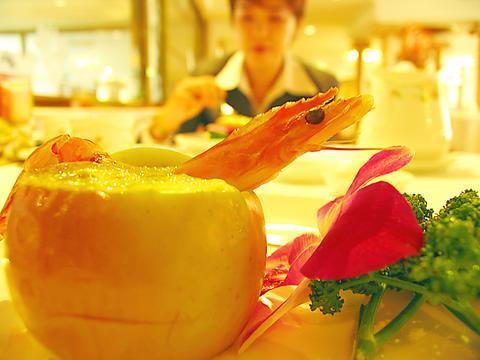For a fruity meal fit for a king take a ride up Linsen North Road to the Gloria Prince Hotel and enjoy a combination of sweet pulps, savory meats and fish -- including some rare and unusual items even the most experienced gourmand may not have tried before.
Once you are seated in the elegantly appointed dining room, with its gilded furniture and brightly polished chandeliers, settle down for what could be a two-hour plus gastronomic experience.

PHOTO: JULES QUARTLY, TAIPEI TIMES
There are nine items on the Fruit Set Menu, which was devised by head chef Peter Wu in June and has been continued because of its popularity. The winner of two consecutive cordon bleu contests in Taiwan, Wu hails from Hong Kong and specializes in Cantonese cooking, which he has internationalized for the local and high-end traveler set he services.
The only man to have been the head chef for two presidents on overseas trips (Lee Teng-hui (
The set menu begins with fiery dragon fruit canapes and ends with a mango ice crush. In between the highlights were some highly inventive dishes, only one of which did not succeed, in this reviewer's opinion. That was the seafood and apple with mayonnaise sauce, which looked good enough, but was slightly sickly with the combination of sweet apple and overbearingly rich mayo.
The rest was an adventure for the taste buds that was rewarded by some original and flavorsome combinations. The pumpkin with egg and fried shark's fin was a revelation. The scooped-out half-pumpkin, steamed and filled with lightly fried eggs and bean sprouts, set off the delicately prepared shark's fin. Usually, I find the taste of shark's fin unremarkable, but on this occasion it was a treat. The sharks used are farmed, apparently, so conservationists need not be upset. The dish came with one of the most delicious clear broths I have ever tried. Made from ham, chicken, pork ribs, pumpkin, dried scallops and spices (the chef refuses to disclose), it is boiled, reduced and strained for days to form a golden nectar that is strong, yet refined in taste.
Braised beef and mango went together surprisingly well, the scallop dishes were superb and the deep fried banana fruit rolls were impeccable.
However, the most remarkable dish, fittingly enough, came last. Hasma sweet soup in papaya sounds bland enough, but the reproductive glands of the snow frog, dried, rehydrated and double-boiled with rock sugar, is a unique culinary invention that was previously only eaten by emperors. The hermaphrodite snow frog's sperm and ova form a glutinous and opaque dessert after cooking. It sounds weird and feels like tapioca in the mouth, but with a slightly salty after taste. Yes, indeed, a funny experience.

In Taiwan there are two economies: the shiny high tech export economy epitomized by Taiwan Semiconductor Manufacturing Co (TSMC, 台積電) and its outsized effect on global supply chains, and the domestic economy, driven by construction and powered by flows of gravel, sand and government contracts. The latter supports the former: we can have an economy without TSMC, but we can’t have one without construction. The labor shortage has heavily impacted public construction in Taiwan. For example, the first phase of the MRT Wanda Line in Taipei, originally slated for next year, has been pushed back to 2027. The government

July 22 to July 28 The Love River’s (愛河) four-decade run as the host of Kaohsiung’s annual dragon boat races came to an abrupt end in 1971 — the once pristine waterway had become too polluted. The 1970 event was infamous for the putrid stench permeating the air, exacerbated by contestants splashing water and sludge onto the shore and even the onlookers. The relocation of the festivities officially marked the “death” of the river, whose condition had rapidly deteriorated during the previous decade. The myriad factories upstream were only partly to blame; as Kaohsiung’s population boomed in the 1960s, all household

Allegations of corruption against three heavyweight politicians from the three major parties are big in the news now. On Wednesday, prosecutors indicted Hsinchu County Commissioner Yang Wen-ke (楊文科) of the Chinese Nationalist Party (KMT), a judgment is expected this week in the case involving Hsinchu Mayor Ann Kao (高虹安) of the Taiwan People’s Party (TPP) and former deputy premier and Taoyuan Mayor Cheng Wen-tsan (鄭文燦) of the Democratic Progressive Party (DPP) is being held incommunicado in prison. Unlike the other two cases, Cheng’s case has generated considerable speculation, rumors, suspicions and conspiracy theories from both the pan-blue and pan-green camps.

Stepping inside Waley Art (水谷藝術) in Taipei’s historic Wanhua District (萬華區) one leaves the motorcycle growl and air-conditioner purr of the street and enters a very different sonic realm. Speakers hiss, machines whir and objects chime from all five floors of the shophouse-turned- contemporary art gallery (including the basement). “It’s a bit of a metaphor, the stacking of gallery floors is like the layering of sounds,” observes Australian conceptual artist Samuel Beilby, whose audio installation HZ & Machinic Paragenesis occupies the ground floor of the gallery space. He’s not wrong. Put ‘em in a Box (我們把它都裝在一個盒子裡), which runs until Aug. 18, invites